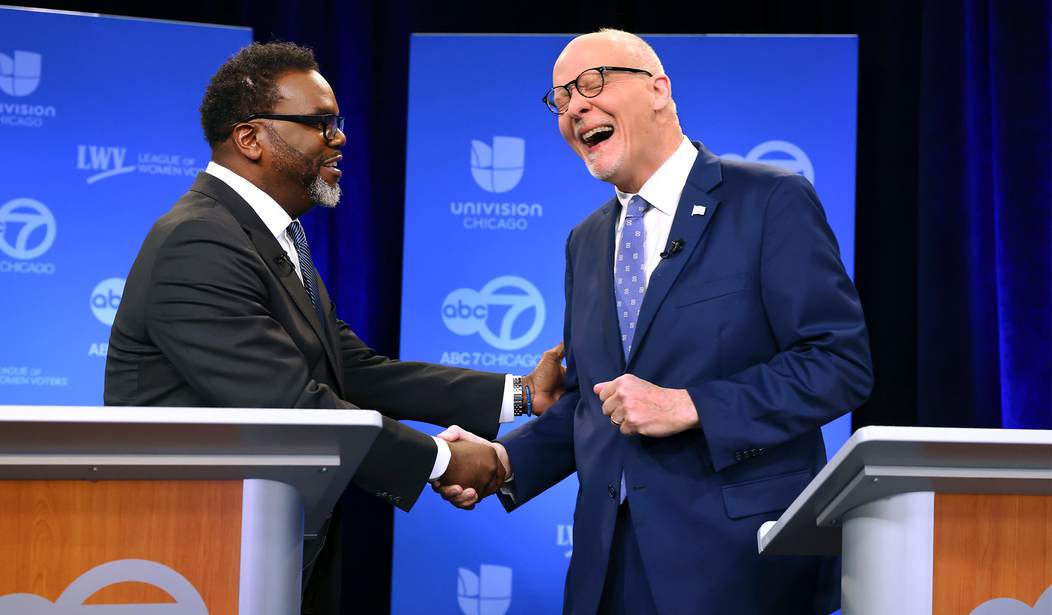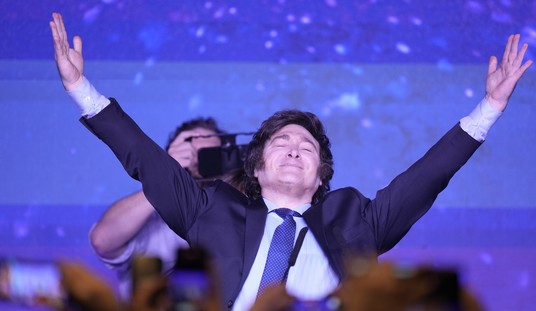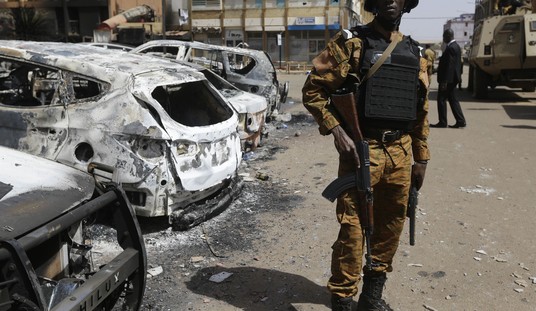See results below.
Chicago voters will go to the polls on Tuesday to choose their next mayor with the out-of-control crime rate uppermost in their minds. Former Chicago public schools CEO Paul Vallas and Cook County Commissioner Brandon Johnson offer two different visions for the voters — and two different versions of reality.
Both men are Democrats and men of the left. But there are stark contrasts that separate the candidates and give the voters a clear choice.
Vallas portrays himself as a hard-headed realist. He believes that without public order, the rest of his agenda won’t matter that much. He wants to rebuild the Chicago Police Department and not just in manpower. The CPD’s morale is at rock bottom with many officers complaining that, between the Department of Justice consent decree and City Hall’s failure to back them in high-profile shootings, policing the city effectively has become nearly impossible.
Johnson also wants to expand the department, coming out in favor of adding detectives in order to raise the number of arrests. This was after he spent the previous two years advocating for defunding the police.
But Johnson thinks putting a lot more money into mental health programs will work better than more police.
The 47-year-old says that instead of investing more in policing and incarceration, the city should focus on mental health treatment, affordable housing for all and jobs for youth. He has proposed a plan he says will raise $800 million by taxing “ultrarich” individuals and businesses, including a per-employee “head tax” on employers and an additional tax on hotel room stays. Vallas says that so-called “tax-the-rich” plan would be a disaster for the city’s recovering economy.
Vallas, who finished in first place in the February election, was the only white candidate in that nine-person field. The 69-year-old was endorsed by Sen. Dick Durbin of Illinois, as well as the local Chamber of Commerce. The grandson of Greek immigrants, he grew up working in family restaurants. He has two sons who have worked as police officers, one of whom is now a firefighter.
Fifty-one percent of Chicagoans want more police on the streets. The fact that it isn’t higher speaks volumes about the low regard Chicago cops are held in by many in the black community. Whether either candidate can restore the faith of all Chicagoans in the city’s police department is unknown.
But Johnson’s radical vision extends far beyond his ideas to reduce the importance of police. His tax plan would force thousands of wealthy Chicagoans and the companies they own to flee the city. It’s a radical social experiment that gambles on the lives of residents.
His plan to raise $800 million doesn’t even add up.
- $98 million from “making the big airlines pay for polluting the air” in Chicago neighborhoods
- $400 million from raising the real estate transfer tax on high-end home sales on properties worth more than $1 million over four years
- $100 million from new “user fees on high-end commercial districts frequented by the wealthy, suburbanites, tourists and business travelers.”
- Over $20 million from reinstating the $4-a-month-per-employee “head tax” on “large companies” that perform at least half their work in Chicago.
- $100 million from taxing financial transactions at a rate of $1 or $2 for every “securities trading contract.”
- $30 million from increasing Chicago’s already nation-leading hotel tax
In total, the revenue plan put forth by the Chicago Teachers Union-backed candidate falls about $52 million short of the amount he’s advertised. Johnson has offered no specifics on how he came up with those figures or what tax rates would need to be to raise this revenue.
There is also a contrast in how the money was raised by both candidates. Ninety-one percent of Johnson’s campaign cash comes from 27 union PACs — more than half from teacher’s unions.
Meanwhile, 71% of Vallas’s campaign contributions come from individuals. It’s clear which is the “special interest” candidate.
Vallas leads by four points in a poll released on Monday. But this is a race that’s clearly too close to call and may not even be decided until all the votes have been counted. The radical left has been leading the charge in record-setting early voting numbers and is making a maximum push to get its people to the polls. Vallas must overcome voter apathy and cynicism to get his voters to the polls.
If Chicagoans see this as a pivotal moment to save their city, Vallas may eke out a victory. If not, Johnson will likely continue the rapid decline of a once proud metropolis whose motto used to the “The City That Works.”
You can see live results of this election from our friends at DecisionDeskHQ here:









Join the conversation as a VIP Member